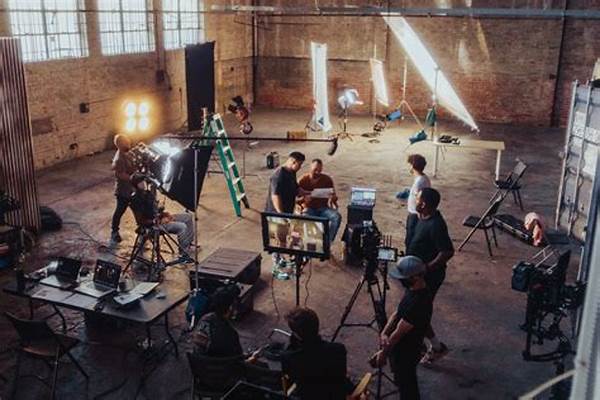Hey there, fellow entertainment enthusiasts! Have you ever noticed how your favorite TV stars sometimes pop up on the big screen, leaving us either in awe or feeling a bit nostalgic? The journey from the small screen to the glitzy world of cinema isn’t always smooth. Let’s dive into the fascinating world of TV stars transitioning to film.
Read Now : Advanced Combat Stunt Training
Why Screen Stars Are Transitioning from TV to Film
Lately, it seems like more and more TV actors are making their way to Hollywood’s bigger stage. This trend isn’t new, but it’s definitely gaining momentum. So, what gives?
For one, transitioning from TV to film offers actors a chance to expand their artistic horizons. Many TV stars desire the creative challenges that come with film roles. Additionally, films often provide more exposure and can lead to bigger paychecks. Let’s not forget the allure of seeing one’s face on the silver screen! However, screen stars transitioning from TV to film must adapt to different acting styles and longer production schedules. Despite the challenges, many actors find the experience rewarding and transformative, opening up new opportunities in their careers.
Challenges and Triumphs in the Transition
1. Different Dynamics: Moving from TV to film means adjusting to new work dynamics. Films usually have bigger budgets and longer shooting schedules.
2. Typecasting Issues: Screen stars transitioning TV to film often battle being typecast. TV roles can pigeonhole actors into specific types, making it tough to land diverse film roles.
3. Audience Acceptance: There’s always the risk that an established TV audience won’t follow an actor to film. Convincing fans to see them in a new light can be challenging.
4. Skill Adaptation: Acting for TV and movies involves different skill sets. TV actors might need to refine their techniques to fit the cinematic experience.
5. Opportunities for Growth: Despite the challenges, transitioning offers incredible growth as artists explore new narratives and characters.
Success Stories of Screen Stars Transitioning TV to Film
From Jennifer Aniston to Will Smith, the list of successful transitions is long. These stars have managed to bring their TV charisma to the big screen, captivating audiences all over again. Aniston’s journey from socialite Rachel in “Friends” to film roles like in “The Good Girl” shows her versatility and ability to adapt. Smith’s move from “The Fresh Prince of Bel-Air” to blockbuster hero in movies like “Independence Day” is nothing short of iconic. Screen stars transitioning TV to film like them prove that with the right roles and timing, such a shift can be both lucrative and fulfilling.
Smith’s blockbuster status is a testament to hard work and timing, and Aniston’s consistent charm in both mediums is a masterclass in career longevity. These trailblazers inspire a new generation of actors contemplating the jump from TV to film. Their stories underline the essence of adaptation and the courage to embrace new challenges.
Key Factors Influencing Successful Transitions
Let’s break it down:
1. Role Selection: Choosing the right roles is crucial for screen stars transitioning TV to film. It’s all about finding characters that resonate with them and the audience.
2. Networking and Relationships: Creating movements in both TV and film circles can impact an actor’s career trajectories.
3. Public Image: Maintaining a positive and relatable image can help actors resonate with audiences both in TV and film.
Read Now : Influential Women Entrepreneurs And Innovators
4. Diverse Skill Set: Flexibility in acting techniques aids the transition.
5. Patience and Resilience: Not all transitions are instant successes. Persistence is key.
6. Media and Press Management: Engaging with the media wisely can promote their move and reduce potential tabloid gossip.
7. Audience Engagement: Never underestimate the power of a dedicated fan base.
8. Experience: Having a mix of different roles allows for easier adaptation to the diverse demands of film.
9. Timing: Strategic career planning and timing can play a significant role in an actor’s success when transitioning.
10. Investment in Craft: Constant learning and adaptation are necessary to tackle varied roles across media.
Long-Term Impact on Entertainment
Think about the long-term impact of screen stars transitioning TV to film—it’s more profound than you might realize. These transitions bridge the gap between television and movies, often leading to a more blended form of entertainment. Networks and studios are capitalizing on this by creating roles specifically tailored for actors with a strong TV background. This phenomenon isn’t just about actors chasing new horizons; it influences how content is created and consumed.
You may also notice that this trend leads to more varied careers. Many actors return to television with newfound respect and credibility, bringing skills and experiences that enrich their performances. The cycle of movement between TV and film has become a dance that benefits both industries, leading to an exciting time for fans and creators alike.
The Power of Screen Stars Transitioning TV to Film
The power these transitions have over the industry and its audiences is immense. When a beloved TV actor shifts into films, it often brings their established audience along for the ride. Fans are excited to see actors experimenting with new genres or managing leading roles that showcase their growth. This dynamism keeps the entertainment scene buzzing with fresh narratives built off familiar faces. The cycle of growth and return enhances the industry.
In conclusion, screen stars transitioning from TV to film continue to create ripples in the entertainment world, constantly enriching and challenging both mediums to evolve and adapt. It’s an exciting journey that we’re all invited to watch unfold. Cheers to the stars who dare to dream beyond the screen and the magic they bring to a theater near you!
